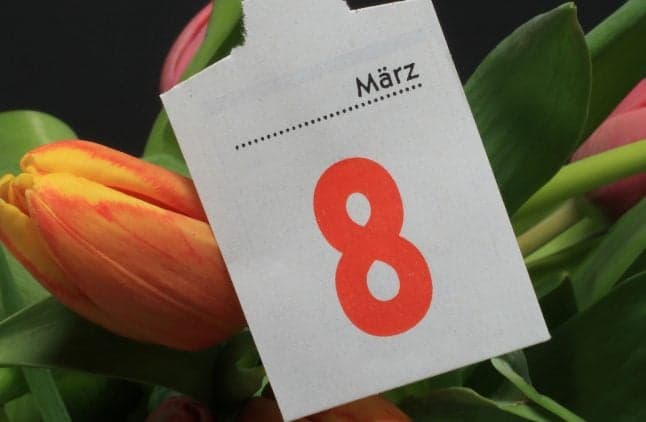'Half of Germans' think Women's Day should be national public holiday

According to a new poll, every second German believes that International Women's Day, which takes place on March 8th, should become a public holiday throughout Germany.
In a survey conducted by YouGov, an opinion research institute, on behalf of DPA, 47 percent of respondents vowed in favour of Women’s Day becoming a national holiday - and hence day off from work.
Five percent of those surveyed thought that Women's Day should become a public holiday in some German states, but not necessarily in all of them.
So far, this is the case in only one of Germany's 16 federal states: Women’s Day (or 'Frauentag' as it's known in German) became a public holiday in Berlin in 2019.
READ ALSO: What you should know about 'Frauentag', Berlin's newest public holiday
However, according to the survey, 29 percent of German citizens strongly disagree, stating "March 8th should not be a holiday in any federal state at all."
Unsurprisingly, more women than men — 54 percent vs. 41 percent — would want Women's Day to become a public holiday.
READ ALSO: VIDEO: Berliners on what Women's Day means to them
And the younger the respondents, the stronger their desire for a day off on March 8th: Almost two-thirds (62 percent) of 18- to 24-year-olds voted in favour, but only 40 percent of those over 55.
Women's Day was first organised in Germany and neighbouring countries on March 19th 1911, at the suggestion of German Social Democrat Clara Zetkin.
Since 1921, it has been celebrated annually throughout the world on March 8th and, in 1977, the UN General Assembly officially recognised the day.
READ ALSO: German word of the day: Frauentag
Comments (6)
See Also
In a survey conducted by YouGov, an opinion research institute, on behalf of DPA, 47 percent of respondents vowed in favour of Women’s Day becoming a national holiday - and hence day off from work.
Five percent of those surveyed thought that Women's Day should become a public holiday in some German states, but not necessarily in all of them.
So far, this is the case in only one of Germany's 16 federal states: Women’s Day (or 'Frauentag' as it's known in German) became a public holiday in Berlin in 2019.
READ ALSO: What you should know about 'Frauentag', Berlin's newest public holiday
However, according to the survey, 29 percent of German citizens strongly disagree, stating "March 8th should not be a holiday in any federal state at all."
Unsurprisingly, more women than men — 54 percent vs. 41 percent — would want Women's Day to become a public holiday.
READ ALSO: VIDEO: Berliners on what Women's Day means to them
And the younger the respondents, the stronger their desire for a day off on March 8th: Almost two-thirds (62 percent) of 18- to 24-year-olds voted in favour, but only 40 percent of those over 55.
Women's Day was first organised in Germany and neighbouring countries on March 19th 1911, at the suggestion of German Social Democrat Clara Zetkin.
Since 1921, it has been celebrated annually throughout the world on March 8th and, in 1977, the UN General Assembly officially recognised the day.
READ ALSO: German word of the day: Frauentag
Join the conversation in our comments section below. Share your own views and experience and if you have a question or suggestion for our journalists then email us at [email protected].
Please keep comments civil, constructive and on topic – and make sure to read our terms of use before getting involved.
Please log in here to leave a comment.